- Home
- W. Somerset Maugham
Up at the Villa Page 4
Up at the Villa Read online
Page 4
`Cut some rashers of bacon,' she told the young man, `and we'll fry them. What is your name?' With the bacon in one hand and a knife in the other, he clicked his heels together.
`Karl Richter, student of art.’
`Oh, I thought you were Italian,' she said lightly, as she beat the eggs.
`That sounds German.’
`I was Austrian when Austria existed! There was a sullenness in his tone which made Mary give him a questioning look.
`How is it you speak English? Have you ever been to England?' No. I learnt it at school and at the University.’
Suddenly he smiled.
`You're marvelous to be able to do that.’
`To do what?’
`Cook.’
`Would it surprise you if I told you I'd been a working girl and not only was able to cook for myself, but had to?, 'I shouldn't believe it’
`Would you rather believe that I'd lived in luxury all my life with a host of servants to look after me?’
`Yes. Like a princess in a fairy story.’
`Then it's true. I can scramble eggs and fry bacon because that was one of the gifts I received at my christening from my fairy godmother.’
When everything was ready they put it on a tray and, Mary leading, went into the dining-room. It was a large room with a painted ceiling, with a tapestry at each end and great gilt-wood sconces on the side walls. They sat opposite one another in tall stately chairs at a refectory table.
`I'm ashamed of my poor and shabby clothes,' he smiled.
`In this splendid room I should be dressed in silk and fine velvet like the cavaliers in an old picture.’
His suit was shabby, his shoes patched, and his shirt, open at the neck, frayed. He wore no tie. By the light of the tall candles on the table his eyes were dark and cavernous. He had a strange head with close-cropped black hair, high cheek-bones, hollow cheeks, a pallid skin and a look of strain which was somewhat moving. It occurred to Mary that in costume, dressed, say, like one of those young princes in a picture by Bronzino at the Uffizi, he would have been very nearly beautiful.
`How old are you?' she asked him.
`Twenty-three.’
`What else matters?’
`What is the good of youth that has no opportunity? I live in a prison and there's no escape from it.’
`Are you an artist?" He laughed.
`Can you ask me after hearing me play? I'm not a violinist. When I escaped from Austria I got work in a hotel, but business was bad and I was sent away. I've had one or two odd jobs, but it's difficult to get them when you're a foreigner and your papers aren't in order. I play the fiddle when I get the chance just to keep body and soul together, but I don't get the chance every day.’
`Why did you have to leave Austria?’
`Some of us students protested against the Anschluss. We tried to organize resistance. It was stupid of course. We hadn't a hope. The only result was that two of us were shot and the rest put in a concentration camp. They put me in for six months, but I escaped and crossed the mountains into Italy.’
`It all sounds rather horrible,' said Mary. It was a lame and inadequate thing to say, but it was all she could think of. He gave her an ironical smile.
`I'm not the only one, you know. There are thousands and thousands of us in the world now. Anyhow I'm free.’
`But what are your plans for the future?' A look of despair crossed his face and he was about to answer. But he made an impatient gesture and laughed.
`Don't let me think of that now. Let me enjoy this priceless moment. Nothing has ever happened to me like this in all my life. I want to enjoy it so that whatever comes to me later it will be a recollection that I can always treasure.’
Mary looked at him strangely and it seemed to her that she could hear the beating of her heart. It had been almost a joke, what she had said to Rowley, the reverie of an idle day that, when the moment came, she knew she would shrink from. Had the moment come now? She felt queerly reckless. She drank very little as a rule and the strong red wine she had been drinking to keep him company had gone to her head. There was something mysteriously disturbing in thus sitting in that vast room with its memories of long ago opposite this young man with the tragic face. It was long past midnight. The air that came in through the open windows was warm and scented. Mary felt a sort of languor running through her excitement; her heart seemed to melt in her bosom and at the same time the blood seemed to race madly through her veins. She rose abruptly from the table.
`Now I will show you the garden and then you must go' Access to it was most convenient from the great room in which were the frescoes, and thither she led him. On the way through he paused to look at a handsome cassone that stood against the wall; then he caught sight of the gramophone.
`How strange that looks in these surroundings!’
`I sometimes put it on when I'm sitting in the garden by myself.’
`May I put it on now?’
`If you like.’
He turned the switch. By chance the record was that of a Strauss waltz He gave a little cry of delight.
`Vienna. It's one of our dear Viennese waltzes.’
He looked at her with shining eyes. His face was transfigured. She had an intuition of what he wanted to ask her, and saw at the same time that he was too timid to speak. She smiled.
`Can you dance?’
`Oh, yes; I can do that. I dance better than I play.’
`Let me see.’
He put his arm round her and in that sumptuous, empty room, in the dead of night. they waltzed to the old-fashioned charming tune of the Viennese conductor. Then she took his hand and led him out into the garden. By the garish light of day it had sometimes a look that was a trifle forlorn, like a woman much loved who has lost her loveliness; but now under the full moon, with its trimmed hedges and ancient trees, with its grotto and its lawns, it was thrilling and secret. The centuries fell away and wandering there you felt yourself the inhabitant of a fresher, younger world in which instinct was more reckless and consequences less material. The light summer air was scented with the white flowers of night. They walked silently, hand in hand.
`It's so beautiful,' he murmured at last, 'it's almost unbearable.’
He quoted that celebrated line of Goethe's in which Faust, satisfied at length, begs the fleeting moment to stay.
`You must be very happy here.’
`Very,' she smiled.
`I'm glad. You're kind and good and generous. You deserve happiness. I should like to think that you have everything in the world you desire.’
She chuckled.
`At all events I have everything I have any right to hope for.’
He sighed.
`I should like to die this night. Nothing so wonderful will ever happen to me again. I shall think of it all my life. I shall always have this evening to remember, the glimpse of your beauty and the recollection of this lovely spot. I shall always think of you as a goddess in heaven and I shall pray to you as though you were the Madonna.’
He lifted her hand to his lips and with an awkward, touching little bow, kissed it. She gently touched his face. Suddenly he fell on his knees and kissed the hem of her dress. Then a great exaltation seized her. She took his head in her hands, raising him towards her, and kissed his eyes and his mouth. There was something solemn and mystical in the action. She had a feeling that was strange to her. Her heart was filled with loving kindness. He rose to his feet and passionately clasped her in his arms. He was twenty three. She was not a goddess to pray to, but a woman to possess. They went back into the silent house.
5
IT was dark in the room, but the windows were wide open and the moon shone in. Mary was sitting in a straight-backed antique chair and the youth sat at her feet leaning his head against her knees. He was smoking a cigarette and in the darkness the glow shone red. In answer to her questioning he told her that his father had been head of the police in one of the smaller towns of Austria during the Dollfuss Govern
ment and he had put down with severity the various agitations which disturbed the peace during those troubled times. When Schuschnigg became head of the State after the assassination of the little peasant Chancellor, his firmness and determined attitude had maintained him in his post. He favoured the restoration of the Archduke Otto because he thought that this was the only way to prevent Austria, which he loved with ardent patriotism, from being absorbed by Germany. During the three years that followed he aroused the bitter enmity of the Austrian Nazis by the stem measures be took to curb their treasonable activities. On that fatal day when the German troops marched into the defenceless little country he shot himself through the heart. The young Karl, his boy, was then finishing his education. He had specialized in the history of art, but was going to be a schoolmaster. At the moment nothing could be done and with rage in his heart he listened among the crowd to the speech Hitler made at Linz from the balcony of the Landhaus when he entered the town in triumph. He heard the Austrians shout themselves hoarse with joy as they acclaimed their conqueror. But this enthusiasm was soon followed by disillusion, and when some of the bolder spirits gathered together to form a secret association to fight the alien rule by every means in their power they found many adherents. Karl was among them. They held meetings which they were convinced were private; they conspired in an ineffective way; they were no more than boys any of them, and they never dreamt that every move they made, every word they said, was reported at the headquarters of the secret police. One day they were all arrested. Two were shot as a warning to the rest, and the others were sent to a concentration camp. Karl escaped after three months and by good luck was able to get over the frontier into the Italian Tyrol. He had no passport nor papers of any kind, for these had been taken from him in the concentration camp, and he lived in terror of being arrested and either put in prison as a vagabond or deported back to the Reich where a harsh punishment awaited him.
`If I'd only had enough money to buy a revolver rd have shot myself as my father did.’
He took her hand and placed it on his chest.
`There, between the fourth and fifth ribs. Just where your fingers are.’
`Don't say such things,' said Mary, with a shudder, snatching her hand away. He gave a mirthless laugh.
`You don't know how often I've looked at the Arno and wondered when the time would come when nothing was left to me but to throw myself in.’
Mary sighed deeply. His fate seemed so cruel that any words she might have found to console him could only have been futile. He pressed her hand.
`Don't sigh,' he said tenderly.
`I regret nothing any more. It's all been worth it for this wonderful night.’
They ceased to speak. Mary thought of his miserable story. There was no way out. What could she do? Give him money? That would help him for a while perhaps, but that was all; he was a romantic creature, his high-flown, extravagant language was that of a boy who knew more of books than, for all his terrible experiences, of life, and it was quite possible that he would refuse to take anything from her. On a sudden a cock crew. The sound broke the silence of the night so shrilly that she was startled. She took her hand away from his.
`You must go now, my dear,' she said.
`Not yet,' be cried.
`Not yet, my love.’
`The dawn will break soon.’
`Not for a long time yet.’
He raised himself to his knees and threw his arms round her.
`I adore you.’
She disengaged herself.
`No, really you must go. It's so late. Please.’
She felt rather than saw the sweet smile that broke on his lips. He scrambled to his feet. He looked for his coat and shoes and she switched on a light. When he was once more dressed he took her in his arms again.
`My lovely one,' he whispered.
`You've made me so happy.’
`I'm glad.’
`You've given me something to live for. Now I have you I have everything. Let the future look after itself. Life's not so bad; something will turn up.’
`You'll never forget?’
`Never.’
She lifted her lips to his.
`Good-bye, then.’
`Good-bye till when?’ he murmured passionately.
She freed herself again.
`Good-bye for ever, my dear. I'm leaving here very soon - in three or four days, I expect.’
It seemed difficult to say what she had to say.
`We can't see one another any more. You see, I'm not free.’
`Are you married? They told me you were a widow.’
It would have been easy to lie. She did not know what prevented her. She hedged.
`What did you think I meant when I said I wasn't free? I tell you it's impossible we should ever meet again. You don't want to ruin my life, do you?’
`But I must see you again. Once more, only once more. Or else I shall die.’
`My dear, don't be unreasonable. I tell you it's impossible. When we part now we part for ever.’
`But I love you. Don't you love me?' She hesitated a moment. She did not want to be unkind, but thought it necessary at that moment to tell the plain truth. She shook her head and smiled a little.
`No.’
He stared at her as if he didn't understand.
`Then why did you take me?’
`You were lonely and miserable. I wanted to give you a few moments' happiness.’
`Oh, how cruel! How monstrously cruel!’
` Her voice broke.
`Don't say that. I didn't mean to be cruel. My heart was full of tenderness and pity.’
`I never asked for your pity. Why didn't you leave me alone? You have shown me heaven and now you want to thrust me back to earth. No. No. No. He seemed to grow in stature as he flung the words at her. There was something tragic in his indignation. She was vaguely impressed. It had never occurred to her that he would take it like that.
`Perhaps I've been very stupid,' she said.
`I didn't want to hurt you.’
There was no love in his eyes now, but cold, sullen anger. His white face had gone whiter still and it was like a death mask. It made her uneasy. She knew now what a fool she'd been. The servants slept far away and if she screamed they would not hear her. Idiot, idiot that she was! The only thing was to keep her head and not show him that she was frightened.
`I'm terribly sorry,' she faltered.
`I didn't mean to hurt your feelings. If there's anything I can do to make up I'll only be too glad to do it' He frowned darkly.
`What are you doing now? Are you offering me money? I don't want your money. How much money have you got here?' She took her bag which was on the dressing-tables and as she put her hand in felt the revolver. It gave her a start. She had never fired one in her life. Oh, it was nonsense to suppose it would come to that But thank God she had it. Dear Edgar, he hadn't been such an old donkey after all. The inconsequent thought flashed through her mind that it was not with the idea of her ever finding herself in such a situation that he had forced it on her. Even at that moment the idea amused her and she regained her self-possession.
`I've got two or three thousand lire. It would be enough to get you into Switzerland. You'd be safer there. Believe me, I shan't miss it.’
`Of course you won't miss it. You're rich, aren't you? You're rich enough to pay for the pleasure of a night's fun. D'you always have to pay for your lovers? If I wanted money d'you think I'd be satisfied with a few lire? I should take the pearls you wore, and the bracelets you had on your arm.
`You can have them, too, if you want them. They mean nothing to me. They're on the dressing-table. Take them.’
`You vile woman. Are you so vile that you think any man can be bought off at a price? You fool, if money had meant so much to me don't you think I could have made terms with the Nazis? I didn't need to be an outcast. I didn't need to starve.’
`My God, why can't I make you understand? I meant to do you a kindness
, you seem to think I've done you harm. I want to make up for the harm. If I've offended you, if I've hurt you, I ask your forgiveness. I only wanted your good.’
`You lie. An idle, sensual, worthless woman. What good have .you ever done in your life. I wonder? You go about seeking excitement, new experiences, anything to cheat your boredom, and you don't care what injury you cause to others. But this time you've made a mistake. It's a risk to take strange men into one's house. I took you for a goddess and you're just a whore. It would be a good thing, maybe, if I strangled you to prevent you from hurting others as you've hurt me. I could, you know. Who would ever suspect me? Who saw me coming into this house?'
He took a step towards her. She was seized with panic. He looked sinister and menacing. His gaunt face was distorted with hatred and those dark deep-set eyes flashed. She made an effort at self-control. She was still holding the bag in her hand; she snatched the revolver and pointed it at him.
`If you don't go at once I shall fire!’she cried.
`Fire, then.’
He took another step towards her.
`If you come an inch nearer I shall shoot’
`Shoot. Do you think life means anything to me? You will be robbing me of an intolerable burden. Shoot and I'll forgive you everything. I love you!'
His face was transfigured. The sullen rage was wiped clean off it and his great black eyes shone with exaltation. He came towards her, his head thrown back, his arms outspread, offering his breast to her aim.
`You can say a thief broke into your room and you shot him dead. Quick, quick!'
She let the revolver fall from her hand and throwing herself into a chair hid her face and burst into a passion of tears. He looked at her for a moment.
'Hadn't you the courage? Poor child. How stupid you are, how terribly stupid. You mustn't play with men as you played with me. Come.’
He put his arms round her and tried to lift her to her feet. She did not know what he wanted and, still sobbing bitterly, clung to the chair. He hit her hand roughly, so that, crying out with the pain, she let go instinctively; with a swift gesture he picked her up, carried her across the room and roughly threw her down on the bed. He flung himself beside her, took her in his arms and covered her face with kisses. She tried to get away from him, but he would not let her go. He was strong, much stronger than he looked; and she was powerless in his firm grasp. At last she ceased to resist.

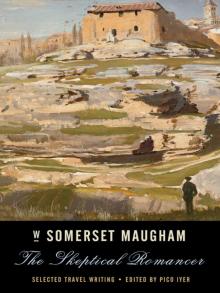 The Skeptical Romancer: Selected Travel Writing
The Skeptical Romancer: Selected Travel Writing The Summing Up
The Summing Up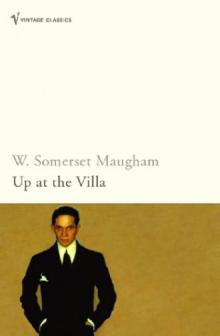 Up at the Villa
Up at the Villa The Razor's Edge
The Razor's Edge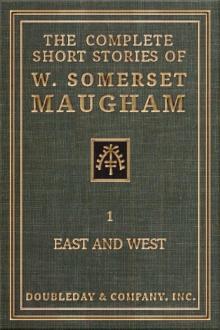 The Complete Short Stories of W. Somerset Maugham: East and West (Vol. 1 of 2))
The Complete Short Stories of W. Somerset Maugham: East and West (Vol. 1 of 2))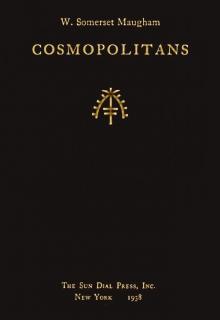 Cosmopolitans
Cosmopolitans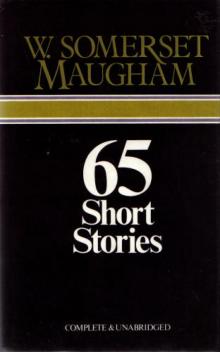 65 Short Stories
65 Short Stories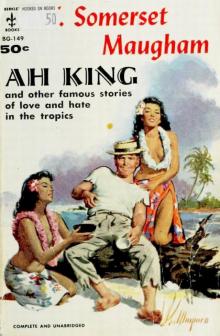 Ah King (Works of W. Somerset Maugham)
Ah King (Works of W. Somerset Maugham)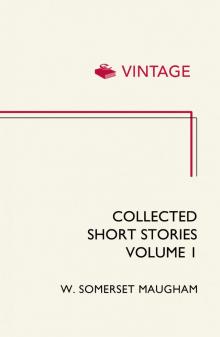 Collected Short Stories: Volume 1
Collected Short Stories: Volume 1 Collected Short Stories Volume 2
Collected Short Stories Volume 2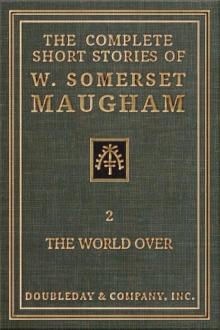 The Complete Short Stories of W. Somerset Maugham - II - The World Over
The Complete Short Stories of W. Somerset Maugham - II - The World Over Collected Short Stories Volume 4
Collected Short Stories Volume 4 Theatre
Theatre Short Stories
Short Stories Then and Now
Then and Now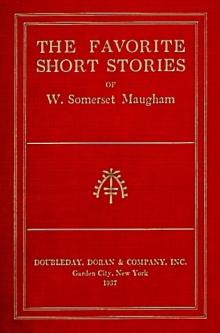 The Favorite Short Stories of W. Somerset Maugham
The Favorite Short Stories of W. Somerset Maugham Of Human Bondage
Of Human Bondage The Magician
The Magician The Great Exotic Novels and Short Stories of Somerset Maugham
The Great Exotic Novels and Short Stories of Somerset Maugham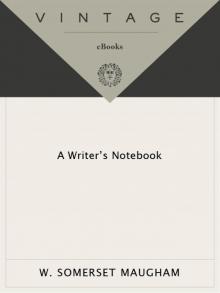 A Writer's Notebook
A Writer's Notebook Christmas Holiday
Christmas Holiday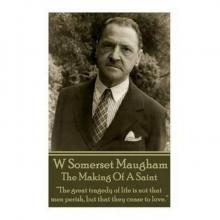 The Making of a Saint
The Making of a Saint Merry Go Round
Merry Go Round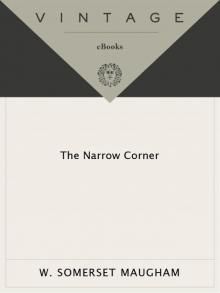 The Narrow Corner
The Narrow Corner Collected Short Stories Volume 3
Collected Short Stories Volume 3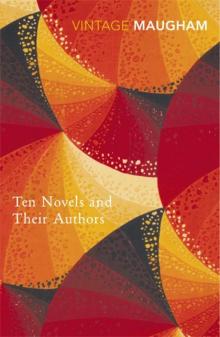 Ten Novels and Their Authors
Ten Novels and Their Authors Ashenden
Ashenden The Moon and Sixpence
The Moon and Sixpence Cakes and Ale
Cakes and Ale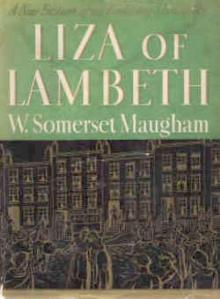 Liza of Lambeth
Liza of Lambeth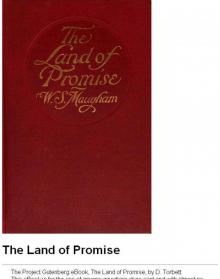 The Land of Promise: A Comedy in Four Acts (1922)
The Land of Promise: A Comedy in Four Acts (1922) A Writer's Notebook (Vintage International)
A Writer's Notebook (Vintage International)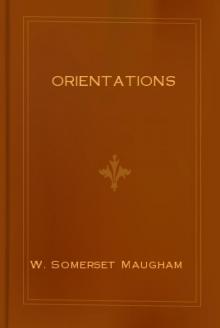 Orientations
Orientations Selected Masterpieces
Selected Masterpieces Mrs Craddock
Mrs Craddock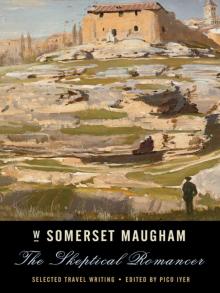 The Skeptical Romancer
The Skeptical Romancer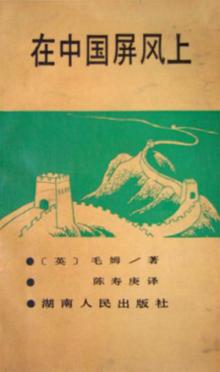 On a Chinese Screen
On a Chinese Screen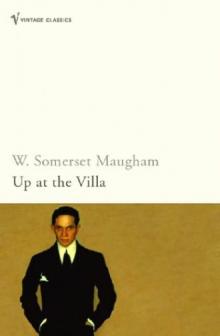 (1941) Up at the Villa
(1941) Up at the Villa The Great Novels and Short Stories of Somerset Maugham
The Great Novels and Short Stories of Somerset Maugham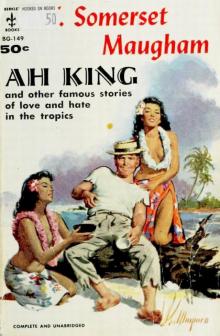 Ah King
Ah King The Explorer
The Explorer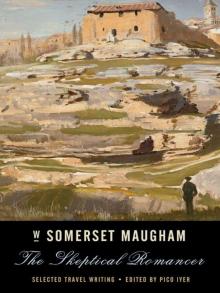 The Skeptical Romancer: Selected Travel Writing (Vintage Departures)
The Skeptical Romancer: Selected Travel Writing (Vintage Departures)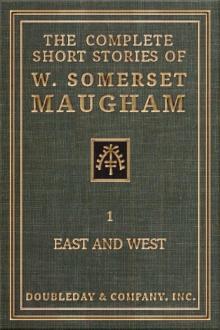 The Complete Short Stories of W. Somerset Maugham - I - East and West
The Complete Short Stories of W. Somerset Maugham - I - East and West